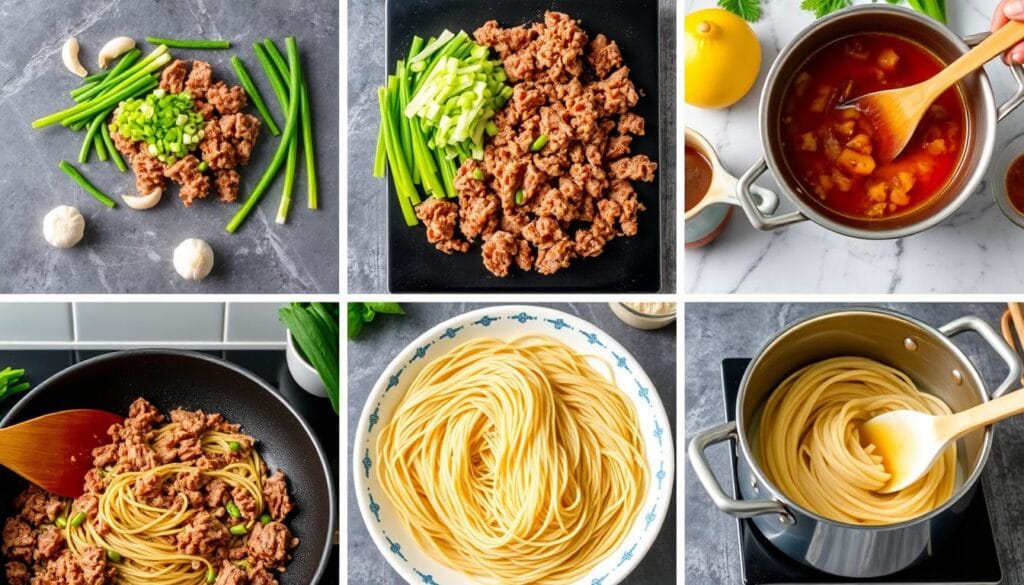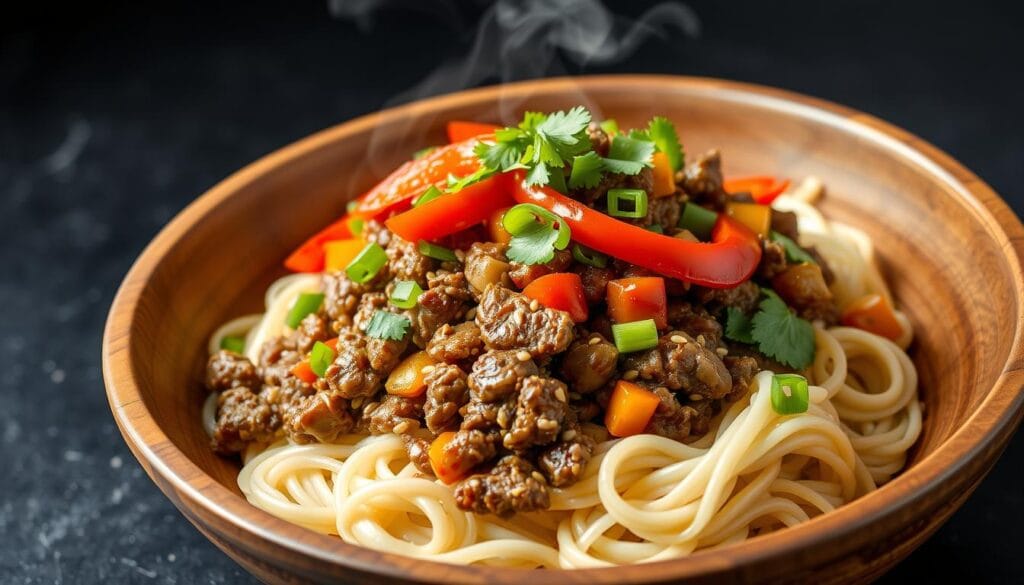Ever dreamed of a dish that fills your belly and takes you to Ulaanbaatar’s lively streets? Imagine a meal that mixes sweet, savory, and umami flavors in a perfect blend. This Mongolian ground beef noodles recipe is your answer. It’s easy to make and offers the comfort you crave.
With simple ingredients and quick prep, you can enjoy homemade Mongolian noodles. They’ll make your taste buds dance with joy!
Whether you’re a pro in the kitchen or a busy home cook, these noodles are great for any night. They mix traditional tastes with today’s ease, bringing happiness and health to your meals. Let’s make this unforgettable dish together!
For a quicker fix, check out this quick and flavorful recipe for ground beef. It’s perfect for adding to your cooking adventures.
Table of Contents
What Are Mongolian Ground Beef Noodles?
Mongolian ground beef noodles are a hearty dish. They mix savory flavors with vibrant textures. The dish includes stir-fried ground beef, fresh vegetables, and tender noodles, all with mouth-watering sauces.
If you want to try authentic Mongolian cuisine, this meal is perfect. It’s satisfying and easy to make.
An Overview of the Dish
The beauty of mongolian ground beef noodles is in its simplicity and strength. When you eat it, you’ll enjoy the balance of flavors. The noodles are chewy, and the beef is rich.
This recipe is easy to change up. You can add different vegetables and seasonings. It’s great for all kinds of tastes and diets.
Origins of Mongolian Cuisine
Mongolian cuisine comes from the nomadic traditions of Mongolian herders. They needed meals that gave them energy for their active lives. Over time, dishes like mongolian ground beef noodles developed.
They use bold flavors and local ingredients. This creates a unique culinary experience. It shows the rich history and culture of Mongolia.
Ingredients You Will Need
To make a tasty Mongolian ground beef noodles dish, you need the right ingredients. These will help you get that authentic, flavorful taste. It’s what makes a traditional Mongolian recipe special.
Essential Ingredients for the Dish
Here’s a list of must-have ingredients for your Mongolian noodles:
- 1 pound ground beef
- 8 ounces yellow noodles
- 3 tablespoons soy sauce
- 2 cloves garlic, minced
- 1 tablespoon ginger, grated
- 3 green onions, chopped
- 2 tablespoons vegetable oil
Optional Add-Ins to Enhance Flavor
Want to make your dish even better? Add these optional ingredients. They boost flavor and nutrition:
- Bell peppers, sliced
- Snap peas
- Carrots, julienned
- Mushrooms, sliced
- Sesame seeds for garnish
Using fresh, quality ingredients is key to a great dish. They make your Mongolian noodles flavorful and enjoyable for everyone.
| Ingredient | Purpose | Notes |
|---|---|---|
| Ground Beef | Main protein source | Choose lean for a healthier option |
| Yellow Noodles | Base of the dish | Traditional choice; can use alternatives |
| Soy Sauce | Seasoning | Add more for a saltier flavor |
| Vegetable Oil | Cooking medium | Can substitute with sesame oil for flavor |
Step-by-Step Cooking Instructions
Follow this easy Mongolian noodles recipe for a tasty homemade meal. This guide breaks down each step, so you get a perfect dish every time.
Preparing the Ground Beef
Start by heating a large skillet over medium-high heat. Add a tablespoon of oil to the pan. Once hot, add your ground beef.
- Break up the beef with a wooden spoon.
- Stir in your chosen spices such as garlic powder, onion powder, salt, and pepper.
- Cook until browned, about 5-7 minutes, ensuring the meat is fully cooked.
Cooking the Noodles
While the beef cooks, prepare the noodles. Most noodles need boiling water.
- Bring a pot of salted water to a boil.
- Add noodles and cook until al dente, usually around 6-8 minutes.
- Drain the noodles and rinse with cold water to stop the cooking process.
Combining All Ingredients
With the ground beef and noodles ready, it’s time to mix everything together.
- Add the cooked noodles to the skillet with the ground beef.
- Mix well, ensuring the noodles are evenly coated with the meat and spices.
- Adjust seasoning according to your taste, adding soy sauce or other condiments as desired.

Mongolian ground beef noodles
Tips for the Perfect Mongolian Ground Beef Noodles
To make the perfect Mongolian ground beef noodles, pay close attention to detail. This includes choosing the right noodles and adjusting spice levels. These tips will help you create a dish that excites your taste buds and meets your preferences.
Choosing the Right Noodles
Choosing the best noodles for Mongolian beef stir fry is key. Egg noodles or rice noodles are great choices. They add texture and complement the savory ground beef well.
Egg noodles bring a rich flavor and hold sauces well. Rice noodles offer a light, chewy texture. Try different varieties to find the perfect match for your taste.
Adjusting Spice Levels for Your Taste
Everyone’s taste is different, so adjusting spice levels is important. Start with a small amount of your favorite spices and taste as you go. If you like it spicier, add chili flakes or sriracha slowly.
This way, you can balance the flavors for both mild and spicy lovers. Customize it to please your guests or for your own fun!
Following these tips will make your cooking experience better. For more ideas, check out this collection of recipes using frozen meatballs. They’re great as a side or appetizer with your noodles.
Common Mistakes to Avoid
When making Mongolian ground beef noodles, knowing common mistakes can help a lot. Two big mistakes are overcooking the noodles and skipping the marinade.
Overcooking the Noodles
It’s key to avoid overcooking noodles. They should be al dente, which means they have a bit of bite. Follow the package instructions carefully. Usually, noodles cook in 5-7 minutes, depending on the type.
Taste a noodle a minute or two before the cooking time ends. This way, you can make sure they’re just right.
Skipping the Marinade
The marinade is very important for Mongolian beef noodles. Marinating the beef for at least 30 minutes makes the flavors richer. This makes the dish more enjoyable.
Don’t skip this step. Use soy sauce, garlic, ginger, and a bit of sesame oil for a great marinade. Marinating the beef will make your meal much better.
Serving Suggestions
Enhancing your experience of serving Mongolian beef noodle stir fry starts with choosing the right sides and garnishes. These elements not only complement the rich flavors of the noodles but also make your meal visually appealing.
Best Sides to Pair With the Dish
For the best sides with Mongolian noodles, consider steamed broccoli, sautéed bok choy, or crispy spring rolls. Each side offers contrasting textures and fresh flavors, balancing your meal. A light Asian-inspired salad with sesame dressing also adds a refreshing touch to the hearty noodles.
Creative Garnishing Ideas
Garnishing your Mongolian noodle dish can take its presentation to the next level. Try adding chopped green onions, toasted sesame seeds, or fresh cilantro. These toppings enhance both the look and taste of your dish. A drizzle of low-sodium soy sauce can also add a burst of zest. Explore these ideas to make your dish stand out and enjoy the art of garnishing.

If you want to recreate the delightful flavors of this dish, the recipe is here.
Storing Leftovers
Enjoyed a tasty meal of Mongolian ground beef noodles? You might have leftovers. Storing them right is key to keeping the dish fresh and tasty for later. Here are some tips to store Mongolian beef noodles leftovers, so they’re just as good the next time.
How to Properly Store Mongolian Ground Beef Noodles
First, let the noodles cool down to room temperature. This step stops moisture from making them soggy. Once they’re cool, put them in an airtight container. This keeps moisture in and odors out.
Don’t forget to label the containers with the date. It helps you remember how long they’ve been stored.
Reheating Tips for Best Results
Ready to enjoy your leftovers? Here are some reheating tips for Mongolian noodles. The microwave is fast. Just put the noodles in a microwave-safe dish, cover with a damp paper towel, and heat in short bursts, stirring often.
For better texture, try reheating on the stovetop. Heat a bit of oil in a pan, add the noodles, and gently toss until warm. This way, you get the dish’s original taste and texture back.
| Storage Method | Pros | Cons |
|---|---|---|
| Airtight Container | Prevents moisture loss Keeps out odors | Requires space in the fridge |
| Microwave | Quick and easy | Can lead to sogginess if overcooked |
| Stovetop | Maintains texture and flavor | Takes longer and requires more effort |
Variations of Mongolian Noodles
Exploring different Mongolian beef noodle variations can make your meals more exciting. You can use various ingredients to meet different dietary needs. This includes vegetarian and gluten-free options, making sure everyone finds something they love.
Vegetarian Alternatives
For a meatless version, try vegetarian Mongolian noodles. Use plant-based proteins like seitan or tofu instead of ground beef. Add bell peppers, carrots, and snap peas for extra flavor and texture.
Gluten-Free Options
Gluten-free diets don’t mean missing out on Mongolian noodles. Use rice noodles or quinoa noodles as substitutes. Choose gluten-free sauces like Tamari or coconut aminos to keep the flavor true. These options let everyone enjoy a delicious meal without dietary worries.
| Category | Options | Key Ingredients |
|---|---|---|
| Vegetarian | Tofu, Seitan | Bell Peppers, Carrots, Snap Peas |
| Gluten-Free | Rice Noodles, Quinoa Noodles | Gluten-Free Soy Sauce, Coconut Aminos |
Frequently Asked Questions
When making Mongolian ground beef noodles, you might wonder about using different proteins. You can try chicken, turkey, or shrimp to make it your own. These choices not only change the taste but also let you follow your diet and use what you have.
Each protein adds its own texture and flavor. This can make your dinner even better.
Can I Use Different Proteins?
Yes, you can get creative with Mongolian ground beef noodles. Using ground chicken or shredded shrimp can make your meals more exciting. The sweet and savory sauce goes well with any protein.
This lets you adjust the recipe to fit your family’s tastes and dietary needs.
How Can I Make This Recipe Ahead of Time?
Meal prepping Mongolian ground beef noodles is easy. Cook the ground beef and noodles, then mix them with the sauce. Keep them separate to stay fresh.
When you’re ready, reheat it on medium heat. Add a bit of water to keep it moist and flavorful. For more tips, check out this recipe.
